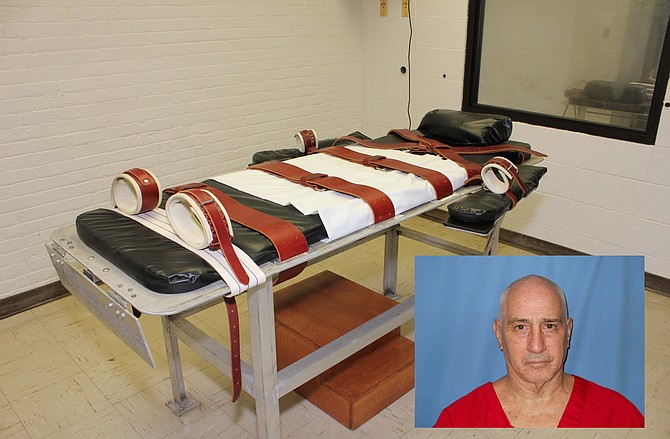Richard Gerald Jordan (pictured), 68, is the oldest inmate on Mississippi's death row, having won three successful appeals only to be resentenced to death. He's also the longest serving, having spent 38 years in death row. Photo courtesy MDOC
JACKSON, Miss. (AP) — The attorney for a Mississippi death row inmate argues in court briefs that he should not be put to death until a federal judge determines if the state's lethal injection protocol is constitutional.
David P. Voisin filed papers Wednesday with the Mississippi Supreme Court on behalf of Richard Gerald Jordan opposing the setting of an execution date sought by the state. Attorney General Jim Hood asked the court to set an execution on or before Aug. 27.
Now 68, Jordan is the oldest inmate on Mississippi's death row, having won three successful appeals only to be resentenced to death. He's also the longest serving, having spent 38 years in death row.
Jordan was convicted of capital murder committed in the course of kidnapping Edwina Marter in Harrison County in 1976.
A jury found Jordan guilty of capital murder in 1976 after hearing testimony about how he planned to kidnap Marter, the wife of a senior vice president at Gulf National Bank, and ask for a $50,000 ransom.
Authorities said Jordan forced Marter to drive to a logging road in Harrison County, then he called Marter's husband, Charles, to get the money. The plan went awry, though, and Jordan shot Marter in the back of the head.
Jordan argued, according to court documents, that Marter tried to escape, and he accidentally hit her when he fired a warning shot.
Jordan is a plaintiff in a pending lawsuit to halt executions by challenging the state's lethal injection protocol. He questions whether the state could mix a safe and effective form of pentobarbital as an anesthetic.
Hood made no mention of the lawsuit in his motion. However, Hood said last week the Mississippi Department of Corrections changed its lethal injection protocol to include the use of midazolam. He said the use of midazolam in lethal injections was recently found to be constitutional and not a violation of the 8th Amendment.
The U.S. Supreme Court in June upheld Oklahoma's use of the sedative, midazolam, in executions.
U.S. District Judge Henry T. Wingate in Jackson has not ruled in the lawsuit. Wingate wrapped up hearings on the lethal injection challenge last week.
Voisin said Jordan didn't learn of the change in the state's protocol until last week and has had no time to study it.
"Regardless of how the federal court rules," Voison said in briefs filed in the Mississippi Supreme Court, "this court should not set an execution date to allow the litigation to proceed in an orderly manner in which ... Jordan has a fair opportunity to litigate whether the State's novel execution protocol comports with constitutional and statutory requirements.
"To date, the State has gone to extraordinary lengths to avoid scrutiny of its lethal injection procedures," Voisin said. "This Court should not set an execution date as long as Jordan has a civil proceeding pending relevant to the execution of his death sentence."
The Department of Corrections has referred all requests for comment to Hood's office.
Copyright Associated Press. All rights reserved. This material may not be published, broadcast, rewritten, or redistributed.



Comments
Use the comment form below to begin a discussion about this content.